现代大学英语精读3 Unit 2 课文 翻译及课文知识重点
现代大学英语精读3Unit2课文翻译与课文知识重点
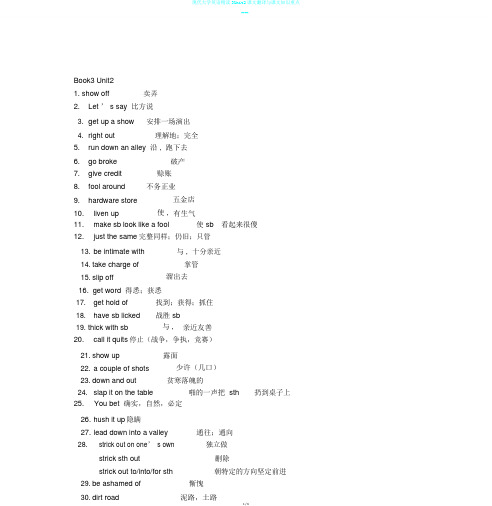
现代大学英语精读3Unit2课文翻译与课文知识重点--Book3 Unit21. show off卖弄2.Let ’ s say 比方说3. get up a show 安排一场演出4. right out 理解地;完全5.run down an alley 沿 , 跑下去6. go broke 破产7. give credit 赊账8. fool around 不务正业9. hardware store 五金店10. liven up 使 , 有生气11. make sb look like a fool 使 sb 看起来很傻12.just the same完整同样;仍旧;只管13. be intimate with 与 , 十分亲近14. take charge of 掌管15. slip off 溜出去16. get word 得悉;获悉17. get hold of 找到;获得;抓住18. have sb licked 战胜 sb19. thick with sb 与 , 亲近友善20.call it quits停止(战争,争执,竞赛)21. show up 露面22. a couple of shots 少许(几口)23. down and out 贫寒落魄的24. slap it on the table 啪的一声把 sth 扔到桌子上25.You bet 确实,自然,必定26. hush it up隐瞒27. lead down into a valley 通往;通向28. strick out on one’ s own 独立做strick sth out 删除strick out to/into/for sth 朝特定的方向坚定前进29. be ashamed of 惭愧30. dirt road 泥路,土路1 / 631. grand marshal 总指挥32. strikev.给sb 印象;停工;撞击;使产生某种感情 strike fear into people’s hearts让 sb处于,状态strick blindn.停工on strick好运(一次,一回);(运气)忽然到临,有时发生Eg: That was a wonderful stroke of luck.33. remember vremember sb/sth 记得;记起(remember of )remember that 记得remember doing 记得做过---2 / 6--remember sb doing sth记得某人做过remember to do sth记得去做remember how/why/whatbe remembered for因,而被be remembered as因,被铭刻34. credit n. 赊账,信贷;学分光荣属于 ,,功绩归于,;give sb credit for sth把sth归功于sb为 ,增光的人(物)sb be a credit to sth35.cover v. 覆盖;掩饰;占地面积;走过一段距离;包含;掩护(军事)n.from cover to cover完全地,重新到尾36. sympathize with=sympathy for = be sympathetic to sb怜悯37. go out of mind发狂go over认真检查go off走开出门;爆炸go on连续;连续go along连续进行某现象;活动go into讨论;研究go under破产go for合用于;喜爱go in for追赶;从事;参加考试go after追求;想法获得go with与,搭配;go together相当;协调go about sth着手做38.for my taste不是我的口胃;不是我喜爱的种类;就我的体验来看39. see to it 保证see sb through sth 足以保持 sb 的 sth40. culture lag 文化落差41. object to doing 反对做 sth3 / 6Translation1.他们的议论包含了全部共同感兴趣的重要问题。
现代大学英语精读3(第二版)知识点讲解

Unit 1Text A课文内容全解1. Has it ever dawned on you that certain developmental changes will occur in your life as you move from adolescence to young adulthood? (L.3, Para.1) adulthood/ˈædʌlthʊd/n. the state of being an adult成年:Many people are able to maintain friendships into adulthood.很多人能够把友谊维持到成年。
2. During this time, students are going through an identity crisis and are endeavoring to find out who they are and what their strengths and weaknesses are. (L.1, Para.2) 【英释】During this period, students are experiencing an identity crisis and are trying to find out who they are and what their strong and weak points are.3. First, there is functional independence, which involves the capability of individuals to take care of practical and personal affairs, such as handling finances, choosing their own wardrobes, and determining their daily agenda. (L.3, Para.4) 【英释】First, there is functional independence, which includes how an individual can handle his or her practical and personal affairs, such as learning how to spend money wisely, choosing his or her own clothes, and deciding what he or she is going to do every day.4. Fourth is freedom from “excessive guilt, anxiety, mistrust, responsibility, inhibition, resentment, and anger in relation to the mother and father.” (L.12, Para.4) 【英释】Children often feel very guilty in relation to their parents because they think they have done something wrong; they are also anxious because they are eager to please their parents; they sometimes feel unhappy because they think that their parents have not been fair to them; they feel that they are responsible to their parents for everything they do; they are always afraid of not saying the right thing or not behaving properly; all these may make them angry with their parents or make them feel resentful. These feelings reflect their emotional dependence on their parents. When they grow up, they usually strive for freedom from this.5. At the same time, these young adults are learning how to give and receive affection in the adult world. (L.1, Para.6) affection/əˈfekʃn/n.①a gentle feeling of caring and loving喜爱;钟爱:She has great affection for her little brother.她很疼爱她的弟弟。
杨立民《现代大学英语精读(3)》(第2版)【词汇短语+课文精解+全文翻译+练习答案】(Unit 2)
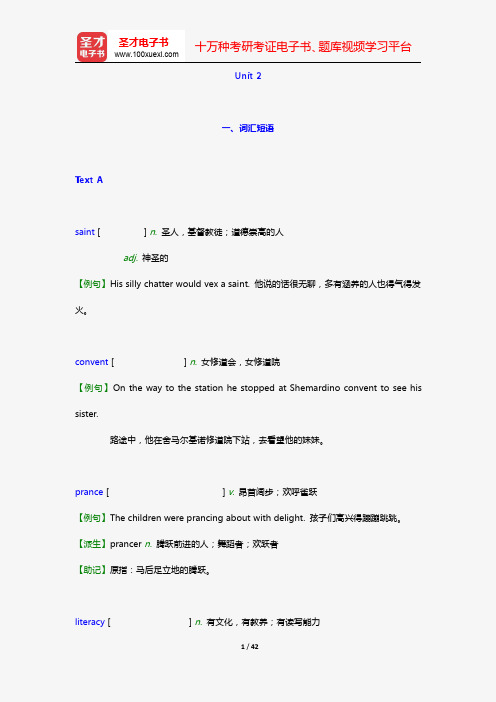
Unit2一、词汇短语Text Asaint[]n.圣人,基督教徒;道德崇高的人adj.神圣的【例句】His silly chatter would vex a saint.他说的话很无聊,多有涵养的人也得气得发火。
convent[]n.女修道会,女修道院【例句】On the way to the station he stopped at Shemardino convent to see his sister.路途中,他在舍马尔基诺修道院下站,去看望他的妹妹。
prance[]v.昂首阔步;欢呼雀跃【例句】The children were prancing about with delight.孩子们高兴得蹦蹦跳跳。
【派生】prancer n.腾跃前进的人;舞蹈者;欢跃者【助记】原指:马后足立地的腾跃。
literacy[]n.有文化,有教养;有读写能力【例句】Literacy is an essential foundation for development and prosperity.识字是发展和繁荣必不可少的基础。
curl[]v.(使)卷曲;卷曲,扭曲n.卷发;卷曲状;卷曲物【例句】The wave curled over the surfer.波浪从冲浪运动员头上盘旋而过。
【词组】curl up蜷缩【派生】curly adj.卷曲的;卷毛的barrel[]n.桶;枪管,炮管vt.把…装入桶内vi.快速移动【例句】The cement is barreled.水泥已经装桶了。
【派生】barreled adj.桶装的;有管的sling[]n.绷带;责难v.扔,甩;投进,投掷;悬挂【例句】The line of flags was slung up between two trees.一排旗帜悬挂在两棵树之间。
【搭配】sling someone out赶走某人,驱逐某人lure[]n.吸引力,魅力;诱惑物vt.引诱,吸引【例句】The enticement of the big city lure her away from her home.大城市的种种诱惑吸引了她离家出走。
现代大学英语精读3_第二版_unit1、2课文翻译

Unit 1 Your college years1你可曾考虑过作为一个大学生你生活中正在发生和即将发生的变化?你可曾想到过大学时代教授们以及其他教职工为了你的成长和发展制定了目标?你可曾注意过你在从青少年渐渐成人的过程中会发生某些变化?尽管大学生很少想这些,但是在大学生时代很可能会发生一些主要的变化。
2在这段时期,学生们正经受自我认同危机,他们努力要了解自己的身份,掌握自身的优缺点。
当然,优缺点他们兼而有之,且两者都为数不少。
重要的是人们如何看待自己,其他人又如何看待他们。
皮尔斯和兰多曾在一篇文章中探讨了爱立信在《国际社会百科全书》中有关理论,根据他们的观点,性格特征是由先天基因(即父母的遗传物质)所决定,由外部环境而形成,并受偶然事件的影响的。
人们受环境的影响,反过来也影响他们的环境。
人们如何看待自己扮演的这两个角色无疑正是他们性格特征的部分表现。
3学生们经历自我认同危机的时候,他们也开始渐渐独立,但是可能仍然非常依赖父母。
这种介于独立与依赖之间的冲突常常发生在青少年末期。
事实上,这种冲突很可能因为他们选择继续接受大学教育而愈发激烈。
高中一毕业,一些学生便会立即走入社会开始工作。
这种选择的结果就是他们可能他们在经济上获得独立。
但是大学生已经选择了用几年的时间继续掌握新知并且发展自我,因此他们在一定程度上还要依赖父母。
41984年4月杰利弗·A·霍夫曼在《心理咨询杂志》上发表了《即将成人的青年与父母的心理距离》,文章中他提及了人与父母产生心理距离的四个不同方面。
第一,独立处理日常生活的能力,它包括个人独立处理实际事物和自身事务的能力,如理财的能力、选购服装的能力和决定每天工作日程的能力。
第二,态度独立,即个人学会正确看待和接受自己与父母的态度、价值和信仰上的差异。
第三个心理分离过程是情感独立,霍夫曼将这一过程定义为“摆脱父母的认可、亲近、陪伴和情感支持的过分依赖”。
例如,大学生们会随自己所愿自由选择专业,而且并不认为必须征得父母的认同。
现代大学英语精读(杨立民主编)第三册课文翻译
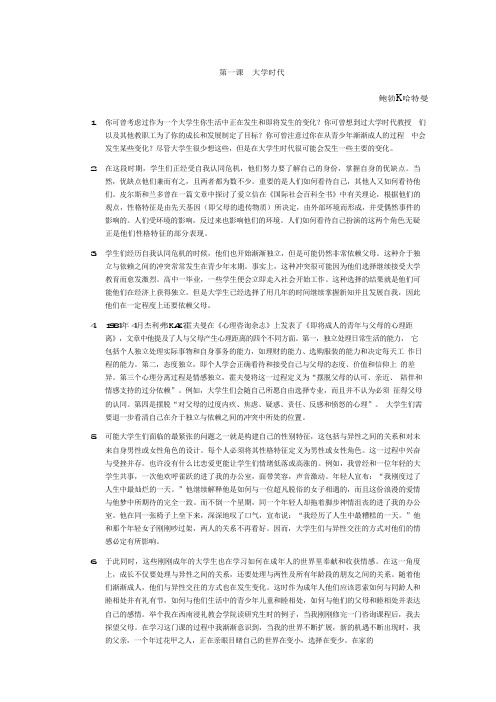
第一课大学时代鲍勃K哈特曼1.你可曾考虑过作为一个大学生你生活中正在发生和即将发生的变化?你可曾想到过大学时代教授们以及其他教职工为了你的成长和发展制定了目标?你可曾注意过你在从青少年渐渐成人的过程中会发生某些变化?尽管大学生很少想这些,但是在大学生时代很可能会发生一些主要的变化。
2.在这段时期,学生们正经受自我认同危机,他们努力要了解自己的身份,掌握自身的优缺点。
当然,优缺点他们兼而有之,且两者都为数不少。
重要的是人们如何看待自己,其他人又如何看待他们。
皮尔斯和兰多曾在一篇文章中探讨了爱立信在《国际社会百科全书》中有关理论,根据他们的观点,性格特征是由先天基因(即父母的遗传物质)所决定,由外部环境而形成,并受偶然事件的影响的。
人们受环境的影响,反过来也影响他们的环境。
人们如何看待自己扮演的这两个角色无疑正是他们性格特征的部分表现。
3.学生们经历自我认同危机的时候,他们也开始渐渐独立,但是可能仍然非常依赖父母。
这种介于独立与依赖之间的冲突常常发生在青少年末期。
事实上,这种冲突很可能因为他们选择继续接受大学教育而愈发激烈。
高中一毕业,一些学生便会立即走入社会开始工作。
这种选择的结果就是他们可能他们在经济上获得独立。
但是大学生已经选择了用几年的时间继续掌握新知并且发展自我,因此他们在一定程度上还要依赖父母。
4.1984年4月杰利弗K A K霍夫曼在《心理咨询杂志》上发表了《即将成人的青年与父母的心理距离》,文章中他提及了人与父母产生心理距离的四个不同方面。
第一,独立处理日常生活的能力,它包括个人独立处理实际事物和自身事务的能力,如理财的能力、选购服装的能力和决定每天工作日程的能力。
第二,态度独立,即个人学会正确看待和接受自己与父母的态度、价值和信仰上的差异。
第三个心理分离过程是情感独立,霍夫曼将这一过程定义为“摆脱父母的认可、亲近、陪伴和情感支持的过分依赖”。
例如,大学生们会随自己所愿自由选择专业,而且并不认为必须征得父母的认同。
现代大学英语精读3_第二版_unit1、2课文翻译
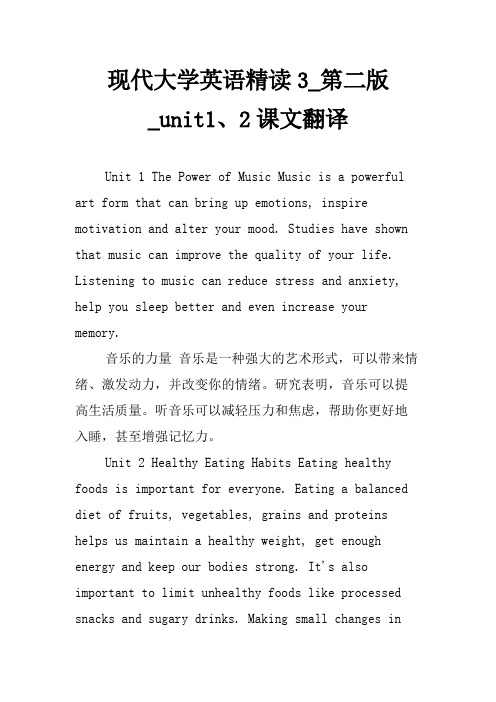
现代大学英语精读3_第二版_unit1、2课文翻译Unit 1 The Power of Music Music is a powerful art form that can bring up emotions, inspire motivation and alter your mood. Studies have shown that music can improve the quality of your life. Listening to music can reduce stress and anxiety, help you sleep better and even increase your memory.音乐的力量音乐是一种强大的艺术形式,可以带来情绪、激发动力,并改变你的情绪。
研究表明,音乐可以提高生活质量。
听音乐可以减轻压力和焦虑,帮助你更好地入睡,甚至增强记忆力。
Unit 2 Healthy Eating Habits Eating healthy foods is important for everyone. Eating a balanced diet of fruits, vegetables, grains and proteins helps us maintain a healthy weight, get enough energy and keep our bodies strong. It's also important to limit unhealthy foods like processed snacks and sugary drinks. Making small changes inyour diet can lead to big improvements in your health.健康的饮食习惯对每个人来说,吃健康的食物都很重要。
精读3 Unit 2 How Reading changed my life 课文及翻译 笔记模板
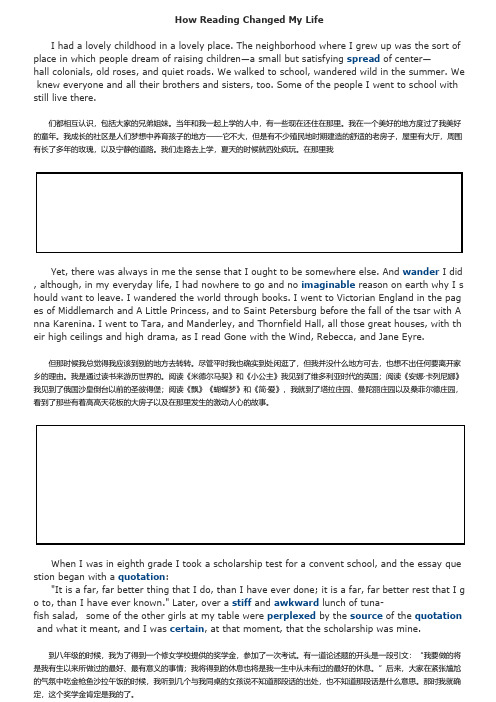
How Reading Changed My LifeI had a lovely childhood in a lovely place. The neighborhood where I grew up was the sort of place in which people dream of raising children—a small but satisfying spread of center—hall colonials, old roses, and quiet roads. We walked to school, wandered wild in the summer. We knew everyone and all their brothers and sisters, too. Some of the people I went to school with still live there.们都相互认识,包括大家的兄弟姐妹。
当年和我一起上学的人中,有一些现在还住在那里。
我在一个美好的地方度过了我美好的童年。
我成长的社区是人们梦想中养育孩子的地方——它不大,但是有不少殖民地时期建造的舒适的老房子,屋里有大厅,周围有长了多年的玫瑰,以及宁静的道路。
我们走路去上学,夏天的时候就四处疯玩。
在那里我How many times had I gone up the steps to the guillotine with Sydney Carton as he went to that far, far better rest at the end of A Tale of Two Cities.我都记不清我曾多少次陪着西德尼·卡顿,像在《双城记》结尾处描写的那样,一步一步走上断头台,走向他所说的最好的休息。
Like so many of the other books I read, it never seemed to me like a book, but like a place I had lived in, had visited and would visit again, just as all the people in them, every blessed one-Anne of Green Gables, Heidi, Jay Gatsby, Elizabeth Bennett, Dill and Scout—were more real than the real people I knew. My home was in that pleasant place outside Philadelphia, but I really lived somewhere else. I lived within the covers of books and those books were more real to me than any other thing in my life. One poem committed to memory in grade school survives in my mind. It is by Emily Dickinson: "There is no Frigate like a book / To take us Lands away / Nor any coursers like a Page / Of prancing Poetry."就像我读过的很多其他书一样,它对我而言从不像是本书,而是一个我居住过、访问过,而且以后还要重访的地方。
大学英语精读第三版第二册中课文翻译
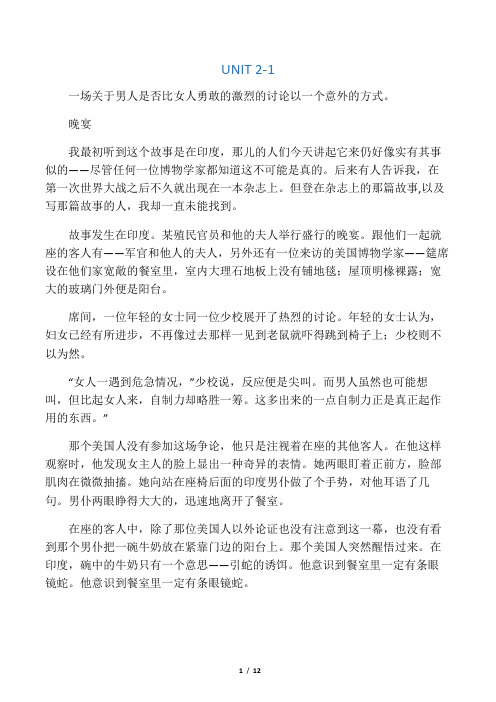
UNIT 2-1一场关于男人是否比女人勇敢的激烈的讨论以一个意外的方式。
晚宴我最初听到这个故事是在印度,那儿的人们今天讲起它来仍好像实有其事似的——尽管任何一位博物学家都知道这不可能是真的。
后来有人告诉我,在第一次世界大战之后不久就出现在一本杂志上。
但登在杂志上的那篇故事,以及写那篇故事的人,我却一直未能找到。
故事发生在印度。
某殖民官员和他的夫人举行盛行的晚宴。
跟他们一起就座的客人有——军官和他人的夫人,另外还有一位来访的美国博物学家——筵席设在他们家宽敞的餐室里,室内大理石地板上没有铺地毯;屋顶明椽裸露;宽大的玻璃门外便是阳台。
席间,一位年轻的女士同一位少校展开了热烈的讨论。
年轻的女士认为,妇女已经有所进步,不再像过去那样一见到老鼠就吓得跳到椅子上;少校则不以为然。
“女人一遇到危急情况,”少校说,反应便是尖叫。
而男人虽然也可能想叫,但比起女人来,自制力却略胜一筹。
这多出来的一点自制力正是真正起作用的东西。
”那个美国人没有参加这场争论,他只是注视着在座的其他客人。
在他这样观察时,他发现女主人的脸上显出一种奇异的表情。
她两眼盯着正前方,脸部肌肉在微微抽搐。
她向站在座椅后面的印度男仆做了个手势,对他耳语了几句。
男仆两眼睁得大大的,迅速地离开了餐室。
在座的客人中,除了那位美国人以外论证也没有注意到这一幕,也没有看到那个男仆把一碗牛奶放在紧靠门边的阳台上。
那个美国人突然醒悟过来。
在印度,碗中的牛奶只有一个意思——引蛇的诱饵。
他意识到餐室里一定有条眼镜蛇。
他意识到餐室里一定有条眼镜蛇。
他抬头看了看屋顶上的椽子——那是最可能有蛇藏身的地方——但那上面空荡荡的。
室内的三个角落里也是空的,而在第四个角落里,仆人们正在等着下一道菜。
这样,剩下的就只有一个地方了餐桌下面。
他首先想到的是往后一跳,并向其他人发警告。
但他知道这样会引起骚乱,致使眼镜索受惊咬人。
于是他很快讲了一通话,其语气非常威严,竟使所有的人安静了下来。
大学英语精读第3册第2课课文翻译及课后答案

大学英语精读第3册 第2课 课文翻译及课后答案Unit 2 获益匪浅的问题获益匪浅的问题詹姆斯·索利斯克描述了他是如何受他的孩子们能用新方法看待事物的影响而认清创造性思维的本质的。
维的本质的。
不久前的一个晚上,在餐桌旁,我的三个孩子——年龄分别为9岁、6岁和4岁——停止了争抢食物,教我关于范式变换、线性思考的局限以及如何重新看待相关的各种因素的知识。
事情是这样的:当时我们在玩自己那套口头儿的“哪个不是同一类?”的芝麻街头游戏。
玩这游戏时,孩子们要看三张画并挑出那张不属同一类的。
我说:“来吧,哪个不是同一类,橘子,西红柿,还是草莓?”老大很快就说出了自以为非常得意的答案:“西红柿,因为另外两种都是水果。
”我承认这是正确答案,尽管有些纯粹主义者坚持认为西红柿是一种水果。
对我们这些从小就不得不吃拌在色拉里的西红柿的人来说,在色拉里的西红柿的人来说,西红柿永远是蔬菜。
西红柿永远是蔬菜。
正当我准备再出别外一组三个东西时,正当我准备再出别外一组三个东西时,我我4岁的孩子说:“正确答案是草莓,因为别外两种都是圆的,草莓却不是。
”我怎么能驳斥他的观点呢?的观点呢?接着,我6岁的孩子说:“是橘子,因为别外两种都是红色的。
”9岁的孩子不想让弟弟妹妹占上风,说道:“是橘子因为其他两种都长在藤上。
”毫无疑问,这里正发生着什么事儿。
这里正发生着什么事儿。
这事儿比争抢食物还乱,这事儿比争抢食物还乱,这事儿比争抢食物还乱,比西红柿是水果还是蔬菜还要比西红柿是水果还是蔬菜还要重要。
哥白尼把太阳视为宇宙中心,哥白尼把太阳视为宇宙中心,重新调整了地心说这一长达数世纪的范式,重新调整了地心说这一长达数世纪的范式,重新调整了地心说这一长达数世纪的范式,我的孩子们我的孩子们正做着哥白尼当年所做的事。
鲁宾·马修斯把他的布朗克斯冰激凌改名为哈根达斯,在不变换产品的情况下提高了价格,我的孩子们正在做着鲁宾·马修斯所做过的事。
现代大学英语精读3第二单元知识点归纳
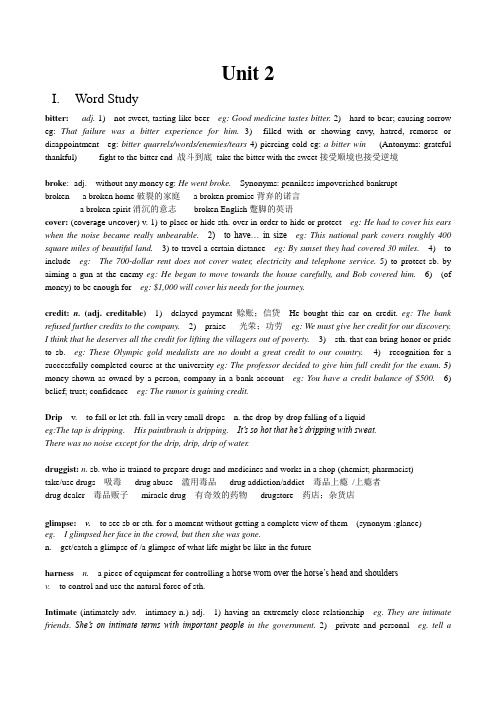
Unit 2I.W ord Studybitter: adj. 1) not sweet, tasting like beer eg: Good medicine tastes bitter. 2) hard to bear; causing sorrow eg:That failure was a bitter experience for him.3) filled with or showing envy, hatred, remorse or disappointment eg: bitter quarrels/words/enemies/tears 4) piercing cold eg: a bitter win (Antonyms: grateful thankful) fight to the bitter end 战斗到底take the bitter with the sweet接受顺境也接受逆境broke:adj. without any money eg: He went broke. Synonyms: penniless impoverished bankruptbroken a broken home破裂的家庭 a broken promise背弃的诺言a broken spirit消沉的意志broken English蹩脚的英语cover: (coverage uncover) v. 1) to place or hide sth. over in order to hide or protect eg: He had to cover his ears when the noise became really unbearable.2) to have… in size eg: This national park covers roughly 400 square miles of beautiful land.3) to travel a certain distance eg: By sunset they had covered 30 miles.4) to include eg: The 700-dollar rent does not cover water, electricity and telephone service. 5) to protect sb. by aiming a gun at the enemy eg: He began to move towards the house carefully, and Bob covered him. 6) (of money) to be enough for eg: $1,000 will cover his needs for the journey.credit: n. (adj. creditable) 1) delayed payment 赊账;信贷He bought this car on credit. eg: The bank refused further credits to the company. 2) praise 光荣;功劳eg: We must give her credit for our discovery.I think that he deserves all the credit for lifting the villagers out of poverty. 3) sth. that can bring honor or pride to sb. eg: These Olympic gold medalists are no doubt a great credit to our country.4) recognition for a successfully completed course at the university eg: The professor decided to give him full credit for the exam. 5) money shown as owned by a person, company in a bank account eg: You have a credit balance of $500. 6) belief; trust; confidence eg: The rumor is gaining credit.Drip v. to fall or let sth. fall in very small drops n. the drop-by-drop falling of a liquideg:The tap is dripping. His paintbrush is dripping. It’s so hot that he’s dripping with sweat.There was no noise except for the drip, drip, drip of water.druggist: n. sb. who is trained to prepare drugs and medicines and works in a shop (chemist; pharmacist)take/use drugs 吸毒drug abuse 滥用毒品drug addiction/addict 毒品上瘾/上瘾者drug dealer 毒品贩子miracle drug 有奇效的药物drugstore 药店;杂货店glimpse: v. to see sb or sth. for a moment without getting a complete view of them (synonym :glance)eg. I glimpsed her face in the crowd, but then she was gone.n. get/catch a glimpse of /a glimpse of what life might be like in the futureharness n. a piece of equipment for controlling a horse worn over the horse’s head and shouldersv. to control and use the natural force of sth.Intimate (intimately adv. intimacy n.) adj. 1) having an extremely close relationship eg. They are intimate friends. She’s on intimate terms with important people in the government. 2) private and personal eg. tell afriend the intimate details of one’s life3) resulting from close study or great familiarity eg. an intimate knowledge of Greek philosophy (Antonyms: distant formal remote)lick: v. 1) to pass the tongue over or under eg. The cat was licking its paws. 2) (esp. of flames, waves) to touch lightly eg. He dashed into the house to save the child despite the licking flames.他不顾四下乱窜的火舌,冲进屋里抢救那个孩子。
大学英语精读第三册第二单元课文fruitful_questions翻译

大学英语精读第三册第二单元课文fruitful_questions翻译fruitful questions1The other night at the dinner table, my three kids-ages 9, 6 and 4-took time out from their food fight to teach me about paradigm shifts, the limitations of linear thinking and how to refocusparameters.2Here's how it happened: We were playing our own oral version of the Sesame Street game, "What Doesn't Belong?," where kids look at three pictures and choose the one that doesn't fit. I said, "OK, what doesn't belong, an orange, a tomato or a strawberry?"3The oldest didn't take more than a second to deliver his smug answer: "Tomato because the other two are fruits." I agreed that this was the right answer despite the fact that some purists insist a tomato is a fruit. To those of us forced as kids to eat them in salads, tomatoes will always be vegetables. I wasabout to think up another set of three when my 4-year-old said, "The right answer is strawberry because the other two are round and a strawberry isn't." How could I argue with that?4Then my 6-year old said, "It's the orange because the other two are red." Not to be outdone by his younger siblings, the 9-year old said, "It could also be the orange because the other two grow on vines."5The middle one took this as a direct challenge. "It could be the strawberry because it's the only one you put on ice cream."6Something was definitely happening here. It was messierthana food fight and much more important than whether a tomato isa fruit or vegetable. My kids were doing what Copernicus didwhen he placed the sun at the center of the universe,readjusting the centuries-old paradigm of an Earth-centered system. They were doing what Reuben Mattus did when he renamed his Bronx ice cream Haagen-Dazs and raised theprice without changing the product. They were doing what Edward Jenner did when he discovered a vaccination forsmallpox by abandoning his quest for a cure.7Instead of studying people who were sick with smallpox, he began to study people who were exposed to it but never got sick. He found that they'd all contracted a similar but milder disease, cow pox, which vaccinated them against the deadly smallpox.82They were refocusing the parameters. They were redefining the problems. They were reframing the questions. In short, they were doing what every scientist who's ever made an important discovery throughout history has done, according to Thomas Kuhn, in his book, "The Structure of Scientific Revolutions":They were shifting old paradigms.9But if this had been a workbook exercise in school, every kid who didn't circle tomato would have been marked wrong. Every kid who framed the question differently than "Which is not afruit?" would have been wrong. Maybe that explains why so many of the world's most brilliant scientists and inventors were failures in school, the most notable being Albert Einstein,who was perhaps this century's most potent paradigm-shifter.104This is not meant to be a critique of schools. Lord knows, that's easy enough to do. This is, instead, a reminder that there are real limits to the value of information. I bring this up because we seem to be at a point in the evolution of our society where everyone is clamoring for more technology, for instant access to ever-growing bodies of information.11Students must be on-line. Your home must be digitally connected to the World Wide Web. Businesses must be able to download volumes of data instantaneously. But unless we shift our paradigms and refocus our parameters, the super information highway will lead us nowhere.12We are not now, nor have we recently been suffering from a lack of information. Think how much more information we have than Copernicus had four centuries ago. And he didn't do anything less Earth-shattering (pun intended) than completely change the way the universe was viewed. He didn't do it byuncovering more information --- he did it by looking differently at information everyone else already had looked at. EdwardJenner didn't invent preventive medicine by accumulatinginformation; he did it by reframing the question.13What we need as we begin to downshift onto the information highway is not more information but new ways of looking at it.We need to discover, as my kids did, that there is more than one right answer, there is more than one right question and there is more than one way to look at a body of information. We need to remember that when you have only a hammer, youtend to see every problem as a nail.。
现代大学英语精读3 Lesson 2 Discovery of a Father 讲解

Lesson 2Discovery of a FatherBy Sherwood AndersonI.background InformationSherwood Anderson was not only a great American writ er, but he was also a businessman, husband and fathe r.The WriterSherwood Anderson was a great American writer. He is the author of 27 works including Winesburg, Ohio, and seven novels that include Poor White, Many Marriages a nd Dark Laughter(see His Works for a complete list). I n the 1920s, author and social critic H. L. Mencken call ed him "America's Most Distinctive Novelist." Anderson was also a poet and a playwright, a newspaper editor a nd a political journalist.As a writer, Anderson is obscured by the generation of writers that followed him, by Hemingway and Faulkner especially, both of whom he helped to get started.The BusinessmanSherwood Anderson began his professional life as an ad vertising man with an agency in Chicago called Long-Cri tchfield. He was also president of United Factories Comp any in Cleveland and president of his own company, An derson Manufacturing Company (later American Merchan ts Corporation), in Elyria. Anderson Manufacturing was known for its paint and roofing products, notably, Roof-Fix.Anderson was representative in his efforts to realize the American dream. His emotional breakdown while presid ent of his own company, however, hastened his move f rom the business world to the world of letters because he recognized that his own personal values were superi or to "money-making as an end in itself."After his commercial success as a writer, Anderson re-e ntered the business world and combined his business an d writing talents by buying two independent newspapers in rural Virginia. For both newspapers, he operated the business side as publisher and managed the editorial si de as editor.The Husband and FatherSherwood and his wife Cornelia had three children, all b orn in Elyria, Ohio: Robert, John and Marion (called Mi mi). When Sherwood wasn't managing the affairs of his business, networking with other businessmen or playin g golf with business associates, he was sometimes seen playing charades in the yard with his children. He taug ht them to act out real-life situations, an approach he t ook to his own problem solving and his writing.In modern terms Sherwood would have called a workah olic. When he wasn't working, however, he was mostly writing. This strained his relationship with Cornelia. Whe n they parted ways in 1914, Sherwood did not forget hi s obligation to Cornelia and their children. He continued to support them financially as long as he had income. Sherwood married four times, but had no other children. He moved frequently throughout his life, eventually set tling in rural Virginia.Where is Winesburg, Ohio?Sherwood lived in many places around the United State s, but he spent nearly half of his life in Ohio. Though his boyhood home of Clyde, Ohio, served as the primary model of his fictional town Winesburg, elements of his o ther Ohio "homes" helped complete the portrait. Sherwo od also lived in the Ohio cities of Cleveland, Elyria and Springfield.His works:Sherwood Anderson is the author of 27 works including seven novels. His works are listed below along with the year each first appeared in print. A list of collected wo rks and books about Sherwood Anderson is also below. Each link provides you with a summary of the work and /or the opportunity to purchase a copy from Amazon.co m. Proceeds from book sales benefit The Sherwood And erson Literary Center.Books by Sherwood AndersonWindy McPherson's Son, 1916Marching Men, 1917Mid-American Chants, 1918Winesburg, Ohio, 1919Poor White, 1920The Triumph of the Egg, 1921Horses and Men, 1921Many Marriages, 1923A Story Teller's Story, 1924Dark Laughter, 1925The Modern Writer, 1925Sherwood Anderson's Notebook, 1926 Tar: A Midwest Childhood, 1926A New Testament, 1927Alice and the Lost Novel, 1929Hello Towns!, 1929Nearer the Grass Roots, 1929The American County Fair, 1930 Perhaps Women, 1931Beyond Desire, 1932Death in the Woods, 1933No Swank, 1934Puzzled America, 1935Kit Brandon, 1936Plays, Winesburg and Others 1937 Home Town, 1940Sherwood Anderson's Memoirs, 1942Collected Works and Books about Sherwood Ander sonA Storyteller and a City: Sherwood Anderson's Chicago The Sherwood Anderson Diaries, 1936-1941 Sherwood Anderson RevisitedSherwood Anderson and the American Short Story Letters to Bab: Sherwood Anderson to Marietta D. Finle y, 1916-33Certain Things LastSherwood Anderson's Secret Love LettersSouthern Odyssey: Selected WritingsThe Egg and Other StoriesCliffs Notes on Winesburg, OhioSherwood Anderson: Great American Short Stories III.Paraphrase1. You hear it said that fathers want their sons to be what they feel they cannot themselves be, but I tell you it also works the other way. (1)Fathers often want their sons to realize their unfulfilled dreams. It is also true that children have thesame demand on their fathers.2. To hear him tell it he’d been in about every battle.(11)If you have heard him tell the story you would thinkthat he has been in about every battle.3. …maybe the woman had dared to sympathize with her. (23)…m aybe the woman had been rude enough or foolish enough to express sympathy for my mother.4. … he put my hand on his shoulder and struck outin darkness. (34)Father and son struck out into the darkness together,with the boy’s hand on the father’s sho ulder. They are swimming together in the pond, but in a symbolicscene, they are also getting ready to fight against heavy odds in life together.III.word study1. strikeHe struck me with a stick.他用棍子打我。
精读3 Unit 2 How Reading changed my life 课文及翻译 笔记模板

How Reading Changed My LifeI had a lovely childhood in a lovely place. The neighborhood where I grew up was the sort of place in which people dream of raising children—a small but satisfying spread of center—hall colonials, old roses, and quiet roads. We walked to school, wandered wild in the summer. We knew everyone and all their brothers and sisters, too. Some of the people I went to school with still live there.们都相互认识,包括大家的兄弟姐妹。
当年和我一起上学的人中,有一些现在还住在那里。
我在一个美好的地方度过了我美好的童年。
我成长的社区是人们梦想中养育孩子的地方——它不大,但是有不少殖民地时期建造的舒适的老房子,屋里有大厅,周围有长了多年的玫瑰,以及宁静的道路。
我们走路去上学,夏天的时候就四处疯玩。
在那里我How many times had I gone up the steps to the guillotine with Sydney Carton as he went to that far, far better rest at the end of A Tale of Two Cities.我都记不清我曾多少次陪着西德尼·卡顿,像在《双城记》结尾处描写的那样,一步一步走上断头台,走向他所说的最好的休息。
Like so many of the other books I read, it never seemed to me like a book, but like a place I had lived in, had visited and would visit again, just as all the people in them, every blessed one-Anne of Green Gables, Heidi, Jay Gatsby, Elizabeth Bennett, Dill and Scout—were more real than the real people I knew. My home was in that pleasant place outside Philadelphia, but I really lived somewhere else. I lived within the covers of books and those books were more real to me than any other thing in my life. One poem committed to memory in grade school survives in my mind. It is by Emily Dickinson: "There is no Frigate like a book / To take us Lands away / Nor any coursers like a Page / Of prancing Poetry."就像我读过的很多其他书一样,它对我而言从不像是本书,而是一个我居住过、访问过,而且以后还要重访的地方。
大学英语精读3课文翻译全

Unit 1 A Brush with the Law一个青年发现,在大街上毫无明显目的地游逛会招致警方的责罚。
误会一个接一个发生,最终他只得出庭受审……与警察的一场小冲突我平生只有一次跟警方发生纠葛。
被捕和出庭的整个过程在当时是一件非常不愉快的事,但现在倒成了一篇很好的故事。
这次经历令人可恼之处在于围绕着我的被捕以及随后庭上审讯而出现的种种武断专横的情况。
事情发生在大约12年前,其时正是2月。
几个月前我中学毕业了,但上大学要等到10月。
当时我还在家中居住。
一天早晨,我来到里士满。
这里是伦敦的一个郊区,离我住的地方不远。
我在寻找一份临时工作,以便积些钱去旅游。
由于天气晴朗,当时又无急事,我便慢悠悠看看橱窗,逛逛公园。
有时干脆停下脚步,四处张望。
现在看来,一定是这种明显的毫无目的的游逛,使我倒了霉。
事情发生在11点半钟光景。
我在当地图书馆谋职未成,刚刚走出来,便看到一个人穿越马路,显然是要来跟我说话。
我以为他要问我时间,不料他说他是警官,要逮捕我。
起先我还以为这是在开玩笑,但又一个警察出现在我的面前,这次是位身着警服的,这一下使我确信无疑了。
“为什么要抓我?”我问道。
“到处游荡,企图作案,”他说。
“作什么案?”我又问。
“偷窃,”他说。
“偷什么?”我追问。
“牛奶瓶,”他板着面孔说道。
“噢,”我说。
事情原来是这样的,在这一地区多次发生小的扒窃案,特别是从门前台阶上偷走牛奶瓶。
接着,我犯了一个大错误。
其时我年方19,留一头蓬乱的长发,自认为是60年代“青年反主流文化”的一员。
所以我想装出一副冷漠的、对这一事件满不在乎的样子。
于是我尽量用一种漫不经心的极其随便的腔调说,“你们跟踪我多久啦?”这样一来,在他们眼里,我就像是非常熟悉这一套的了,也使他们更加确信我是一个地地道道的坏蛋。
几分钟后,开来了一辆警车。
“坐到后面去,”他们说。
“把手放到前排座位的靠背上,不准挪动。
”他们分别坐在我的两边。
这可再也不是闹着玩的了。
大学英语第三册课文翻译unit2
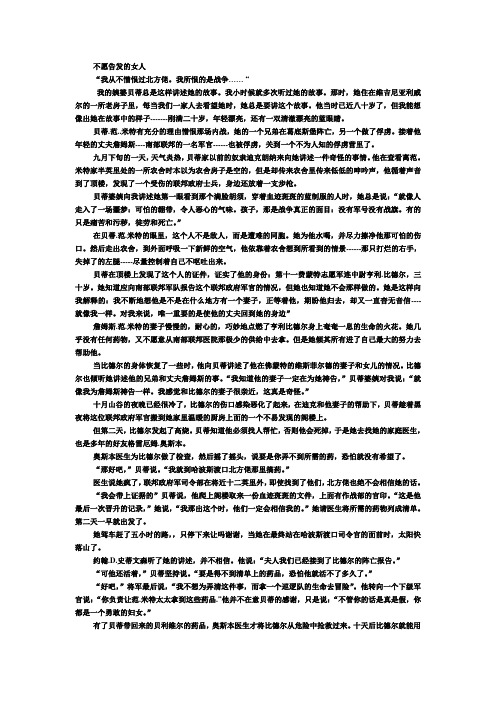
不愿告发的女人“我从不憎恨过北方佬。
我所恨的是战争……“我的姨婆贝蒂总是这样讲述她的故事。
我小时候就多次听过她的故事。
那时,她住在维吉尼亚利威尔的一所老房子里,每当我们一家人去看望她时,她总是要讲这个故事。
他当时已近八十岁了,但我能想像出她在故事中的样子-------刚满二十岁,年轻漂亮,还有一双清澈漂亮的蓝眼睛。
贝蒂.范..米特有充分的理由憎恨那场内战,她的一个兄弟在葛底斯堡阵亡,另一个做了俘虏。
接着他年轻的丈夫詹姆斯----南部联邦的一名军官------也被俘虏,关到一个不为人知的俘虏营里了。
九月下旬的一天,天气炎热,贝蒂家以前的奴隶迪克朗纳来向她讲述一件奇怪的事情。
他在查看离范。
米特家半英里处的一所农舍时本以为农舍房子是空的,但是却传来农舍里传来低低的呻吟声,他循着声音到了顶楼,发现了一个受伤的联邦政府士兵,身边还放着一支步枪。
贝蒂婆姨向我讲述她第一眼看到那个满脸胡须,穿着血迹斑斑的蓝制服的人时,她总是说:“就像人走入了一场噩梦:可怕的绷带,令人恶心的气味。
孩子,那是战争真正的面目:没有军号没有战旗。
有的只是痛苦和污秽,徒劳和死亡。
”在贝蒂.范.米特的眼里,这个人不是敌人,而是遭难的同胞。
她为他水喝,并尽力擦净他那可怕的伤口。
然后走出农舍,到外面呼吸一下新鲜的空气,他依靠着农舍想到所看到的情景------那只打烂的右手,失掉了的左腿-----尽量控制着自己不呕吐出来。
贝蒂在顶楼上发现了这个人的证件,证实了他的身份:第十一费蒙特志愿军连中尉亨利.比德尔,三十岁。
她知道应向南部联邦军队报告这个联邦政府军官的情况,但她也知道她不会那样做的。
她是这样向我解释的:我不断地想他是不是在什么地方有一个妻子,正等着他,期盼他归去,却又一直杳无音信----就像我一样。
对我来说,唯一重要的是使他的丈夫回到她的身边”詹姆斯.范.米特的妻子慢慢的,耐心的,巧妙地点燃了亨利比德尔身上奄奄一息的生命的火花。
她几乎没有任何药物,又不愿意从南部联邦医院那极少的供给中去拿。
现代大学英语精读3课后翻译吐血整理分析解析

Unit1 He is so devoted to 他对他的研究如此专心致志,从来没有过很快就要退休的念头。
1. his research that it never occurs to him that he will soon have to retire. Many people have 我们都有滥用权力的倾向。
如果没有有效的制约,很多人都曾说过,2. observed that, without effective checks, we all have a tendency to abuse our power. Some countries refuse 而且他们对外国的干涉非常反感。
有些国家拒绝卷入这一争端,3. to get involved in this dispute and they resent any foreign interference. of lot a involve will sandstorm of control The 控制沙城暴需要大量的工作和资金。
4. work and money. You must take the local conditions 你们用这些技术的时候,必须考虑到当地的条件。
5. into consideration when you apply these technologies. All applicants will 美元的报名费。
50所有的申请者都必须填好这些表格,然后邮寄6. have to fill out these forms and mail in an application fee of 50 dollars Based on his (careful) 学习是一种自然的乐趣。
他根据对孩子们行为的观察得出结论:7. he behavior, s ’childrenof observation natural a is learning that conclusion the to came pleasure. many of country a In 在一个多民族的国家里,各民族之间的和谐需要小心处理。
大学英语精读课程第三册(unit1-5需要背诵部分课文及翻译)
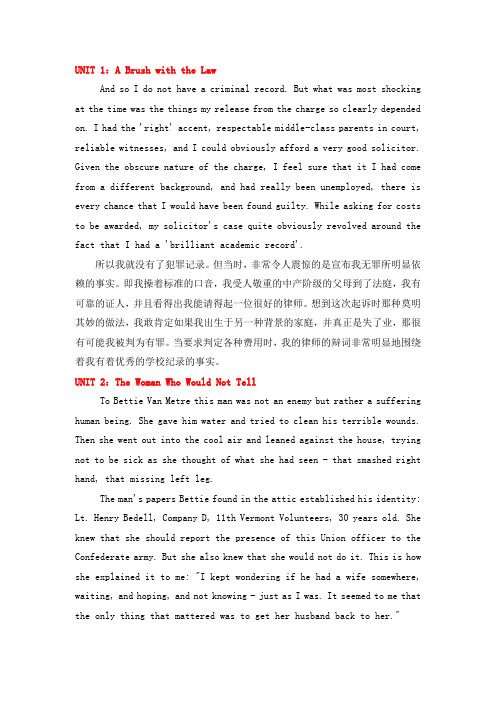
UNIT 1:A Brush with the LawAnd so I do not have a criminal record. But what was most shocking at the time was the things my release from the charge so clearly depended on. I had the 'right' accent, respectable middle-class parents in court, reliable witnesses, and I could obviously afford a very good solicitor. Given the obscure nature of the charge, I feel sure that it I had come from a different background, and had really been unemployed, there is every chance that I would have been found guilty. While asking for costs to be awarded, my solicitor's case quite obviously revolved around the fact that I had a 'brilliant academic record'.所以我就没有了犯罪记录。
但当时,非常令人震惊的是宣布我无罪所明显依赖的事实。
即我操着标准的口音,我受人敬重的中产阶级的父母到了法庭,我有可靠的证人,并且看得出我能请得起一位很好的律师。
想到这次起诉时那种莫明其妙的做法,我敢肯定如果我出生于另一种背景的家庭,并真正是失了业,那很有可能我被判为有罪。
现代大学英语精读第三册第二版课后翻译
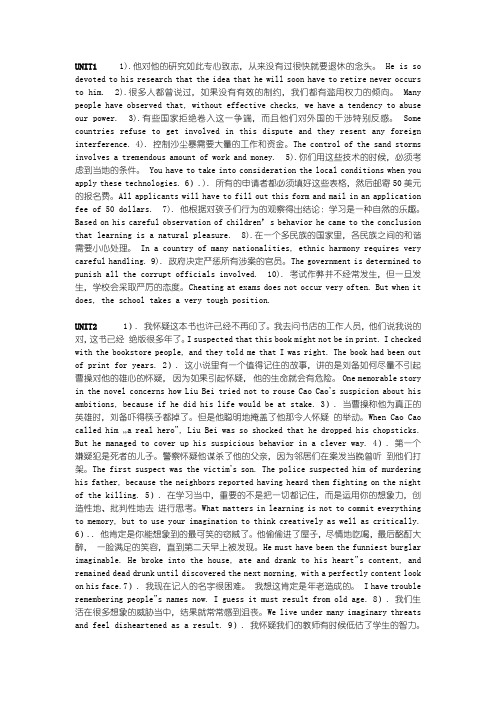
UNIT1 1).他对他的研究如此专心致志,从来没有过很快就要退休的念头。
He is so devoted to his research that the idea that he will soon have to retire never occurs to him. 2).很多人都曾说过,如果没有有效的制约,我们都有滥用权力的倾向。
Many people have observed that, without effective checks, we have a tendency to abuse our power. 3).有些国家拒绝卷入这一争端,而且他们对外国的干涉特别反感。
Some countries refuse to get involved in this dispute and they resent any foreign interference. 4). 控制沙尘暴需要大量的工作和资金。
The control of the sand storms involves a tremendous amount of work and money. 5).你们用这些技术的时候,必须考虑到当地的条件。
You have to take into consideration the local conditions when you apply these technologies. 6).). 所有的申请者都必须填好这些表格,然后邮寄50美元的报名费。
All applicants will have to fill out this form and mail in an application fee of 50 dollars. 7). 他根据对孩子们行为的观察得出结论:学习是一种自然的乐趣。
Based on his careful observation of children’s behavior he came to the conclusion that learning is a natural pleasure. 8).在一个多民族的国家里,各民族之间的和谐需要小心处理。
外教社大学英语精读第三册unit2原文+翻译+课后翻译

Unit 2一、课文James Sollisch describes how his children's ability to see things in fresh ways opened his own eyes to the nature of creative thinking.詹姆斯·索利斯克描述了他是如何因他的孩子们能用新方法看事物而认清创造性思维的本质的。
Fruitful QuestionsJames SollischThe other night at the dinner table, my three kids – ages 9,6 and 4 –took time out from their food fight to teach me about paradigm shifts, and limitations of linear thinking and how to refocus parameters.获益匪浅的问题詹姆斯·索利斯克不久前的一个晚上在餐桌旁,我的三个孩子──年龄分别为9岁、6岁和4岁--暂时停止争抢食物,腾出时间教我认识什么是范式变换、什么是线性思考的局限以及如何重新看待相关的各种因素。
Here's how it happened: We were playing our own oral version of the Sesame Street game, "What Doesn't Belong?" , where kids look at three pictures and choose the one that doesn't fit. I said, "OK, what doesn't belong, an orange, a tomato or a strawberry?"事情是这样的:当时我们在玩自己那套只动嘴的―哪个不是同一类?‖的芝麻街游戏。
- 1、下载文档前请自行甄别文档内容的完整性,平台不提供额外的编辑、内容补充、找答案等附加服务。
- 2、"仅部分预览"的文档,不可在线预览部分如存在完整性等问题,可反馈申请退款(可完整预览的文档不适用该条件!)。
- 3、如文档侵犯您的权益,请联系客服反馈,我们会尽快为您处理(人工客服工作时间:9:00-18:30)。
Book3 Unit2
1.show off 卖弄
2.Let’s say 比如说
3.get up a show 安排一场演出
4.right out 明白地;彻底
5.run down an alley 沿…跑下去
6.go broke 破产
7.give credit 赊账
8.fool around 游手好闲
9.hardware store 五金店
10.liven up 使…有生气
11.make sb look like a fool 使sb看起来很傻
12.just the same 完全一样;依旧;尽管
13.be intimate with 与…十分亲密
14.take charge of 掌管
15.slip off 溜出去
16.get word 得知;获悉
17.get hold of 找到;得到;抓住
18.have sb licked 打败sb
19.thick with sb 与…亲密友好
20.call it quits 停止(战争,争吵,比赛)
21.show up 露面
22. a couple of shots 少量(几口)
23.down and out 穷困潦倒的
24.slap it on the table 啪的一声把sth扔到桌子上
25.You bet 的确,当然,一定
26.hush it up 隐瞒
27.lead down into a valley 通往;通向
28.strick out on one’s own 独立做
strick sth out 删除
strick out to/into/for sth 朝特定的方向坚定行进
29.be ashamed of 羞愧
30.dirt road 泥路,土路
31.grand marshal 总指挥
32.strike v. 给sb印象;罢工;撞击;
使产生某种感情strike fear into people’s hearts
让sb 处于…状态strick blind
n. 罢工on strick
幸运(一次,一回);(运气)突然来临,偶然发生
Eg:That was a wonderful stroke of luck.
33.remember v
remember sb/sth 记得;记起(remember of)
remember that 记得
remember doing 记得做过
remember sb doing sth 记得某人做过
remember to do sth 记得去做
remember how/why/what
be remembered for 因…而被怀念
be remembered as 因…被铭记
34.credit n.赊账,信贷;学分
光荣属于…,功劳归于…;give sb credit for sth 把sth 归功于sb
为…增光的人(物)sb be a credit to sth
35.cover v.覆盖;遮盖;占地面积;走过一段距离;包括;掩护(军事)
n. from cover to cover 彻底地,从头到尾
36.sympathize with=sympathy for = be sympathetic to sb 同情
37.go out of mind 发疯
go over 仔细检查
go off 离开出门;爆炸
go on 持续;继续
go along 继续进行某现象;活动
go into 谈论;研究
go under 破产
go for 适用于;喜欢
go in for 追逐;从事;参加考试
go after 追求;设法得到
go with 与…搭配;
go together 相称;协调
go about sth 着手做
38.for my taste 不是我的口味;不是我喜欢的类型;就我的体验来看
39.see to it 确保
see sb through sth 足以维持sb的sth
40.culture lag 文化落差
41.object to doing 反对做sth
Translation
1.他们的讨论包括了所有共同感兴趣的重要问题。
Their discussion covered all the important issues of mutual interest.
2.明年在上海举行的世界博览会占地约二十万平方米。
The World Fair to be held in Shanghai next year covers an area of about 200,000 square meters.
3.他们越往上爬越困难。
有一段时间里他们四个小时只爬了五米。
The higher they climbed, the more difficult it became. At one time, they only covered 5 meters in 4 hours.
4.那所学校一年向学生收费约三千元。
但这不包括食宿费。
That school charges the students about three thousand yuan a year. But that does not cover food and lodging.
5.那场可怕的沙尘暴使整个城市盖上了厚厚一层土。
That terrible sand storm left the whole city covered with a thick layer of dust.
6.这些文件显示了他们的经理如何设法掩盖他们公司的财务危机。
These papers showed how their manager tried to cover up the financial crisis of the company.
7.我还记得一辆自行车被当作一家最重要财产的那些日子。
I still remember those days when the bike was considered the most important piece of family property.
8.我们必须永远记住不要浪费我们有限的资源。
We must always remember not to waste our limited water resources.
9.我记得那个地方我去过一次。
那地方特别干燥,有时一口井有近一千英尺深。
I remember going to that place once. It was so dry that a well could be nearly 1,300 feet deep.
10.他工作如此专心,以至于常常不记得吃饭。
He was so absorbed in his work that he often did not even remember to eat his meals.
11.我到今天还记得我母亲给我补衣服一直补到深夜。
Even to this day I still remember my mother mending my clothes until late at night.
12.你想要的话,不能赊账,得付现钱。
You can’t geti it on credit. You have to pay cash.
13.我们把我们所有的毕业生,不只是几个名人,都看做我们学校的荣耀。
We regard all our former students, not just a few celebrities, as the credit to our university.
14.“欧洲文化”是用英语讲授的三个学分的课程。
European Culture is a three-credit course conducted in English.
15.人们过去把发现大陆的功劳归之于哥伦布。
People used to give credit to Columbus for the discovery of the New Continent.
16.你觉得那位新头头怎么样?我觉得他似乎挺好的。
So how did our new boss strike you? He seemed quite a nice guy to me .
17.我离开五十年以后重回故乡,故乡的巨大变化给我留下了深刻的印象。
After some 50 years I revisited my home village and I was struck by the great changes that had taken place.
18.近年来由于新的劳动法生效,罢工少了。
There have been fewer strikes in recent years since the new labor law came into effect.
19.武松用他的巨大的拳头不停地打那老虎。
Wu Song strck the tiger again and again with his massive fist.。
